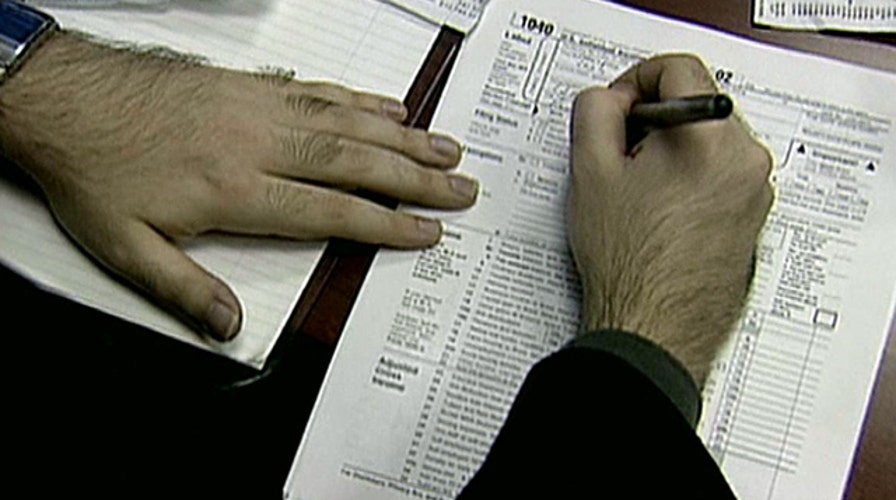Poll: Majority of Americans say fed income taxes too high
Former Reagan economic adviser Art Laffer weighs in
This is a rush transcript from "Your World," April 15, 2014. This copy may not be in its final form and may be updated.
NEIL CAVUTO, HOST: Nearly $1.4 trillion, that is how much the IRS is expected to collect in taxes, even after refunds this year. And many people we spoke to are not happy about it.
(BEGIN VIDEO CLIP)
UNIDENTIFIED MALE: Pay way too much as it is. It's harder and harder every year.
UNIDENTIFIED MALE: I got to pay, was not happy.
UNIDENTIFIED FEMALE: I'm not pleased, but it's -- it's part of being an American.
UNIDENTIFIED FEMALE: I think they should lower the taxes.
UNIDENTIFIED MALE: Three or 4 percent now on top of that for the residence tax and add to the state and the federal. It just -- its adds up.
(END VIDEO CLIP)
CAVUTO: It certainly does, and they're not alone.
A new Gallup poll finds 52 percent of Americans think the amount they pay in taxes is already too high. Meanwhile, a Fox poll finds the number one gripe is the way the government spends the money that they're getting.
And if you think your taxes are too high now, get ready to dig even deeper. That's because the nation's debt is expected to jump from around $17.5 trillion now to more than $27 trillion 10 years from now.
To former Reagan economic adviser Art Laffer, who saw all of this coming. He's got a great new book out, an inquiry into the nature and causes of the wealth estate. He's like the Stephen King of financing. He keeps churning these out
Art, very good to have you.
ART LAFFER, FORMER WHITE HOUSE ECONOMIC ADVISER: Thank you, Neil.
CAVUTO: I do want to talk about obviously people feel a lot of angst on Tax Day and wondering what is coming of the money they're giving the government, no matter where they are in the spectrum.
And we crow about deficits that are less than expected, but a debt that keeps piling on and on and on, don't we?
LAFFER: Yes, we sure do.
I mean, and everything those people said was true. We pay too much in taxes. It's way too complicated, and the government spends it really badly.
(LAUGHTER)
LAFFER: But, other than that, it's terrific.
CAVUTO: Yes, other than that, Mrs. Lincoln, how was the show?
(LAUGHTER)
LAFFER: Yes, right.
CAVUTO: But, you know, what happens here is, they find very creative ways to come up with getting more revenue, but not very creative ways of containing all that spending, and here we go again. Right?
LAFFER: That's true.
There's no constraint on spending in Washington whatsoever. It is really very simple, Neil. I repeat it, but if you tax people who work, and you pay people who don't work, don't be surprised if you find a lot of people not working. And that's exactly what is happening.
CAVUTO: All right, but, you know, Art, a lot of people come back and ones who are watching at the White House -- and, trust me, many at the White House do. I'm looking at you, Mr. President. That's all I'm saying.
Anyway, what they argue, Art, is that, well, if we're doing so badly, look at what has been going on. The unemployment rate is down. Jobs are picking up. Now businesses are starting to hire, albeit not at a pace that we would like to see, but they're starting to hire. So Art is all wet. What do you say?
LAFFER: Well, I just say that we're $3.3 trillion below where we should have been had we continued on average growth from Bill Clinton. And $3.3 trillion is a lot of people.
We're probably, I don't know what, nine million people short on employment today as a share of population. That doesn't sound wonderful to me. Now, maybe these guys have great numbers they can do that we -- we're done from $3.5 trillion, as opposed to $3.3 trillion.
But this is a terrible government, a terrible performance, and it's no better than W. W. was awful, as you and I talked about many times, and this person, this operation is just as bad. There is no improvement coming.
CAVUTO: And you say, the more you tax, or at least put regulations and rules and such on businesses of any size or type, the less inclined they are to hire.
LAFFER: Of course.
Why would you want to hire someone so you can lose money? It doesn't make any sense. The dream of employing people is so you benefit from employing them, they benefit, you benefit, and the customers benefit. If there's some guy in the middle there taking from every side, you know, how can anyone do well when they do that tax wedge between what you pay the worker and what the worker ultimately receives and what you sell your product for and what you ultimately receive?
It just makes it so it's not profitable for anyone? They have just got to get out of the -- really get out of the way and let markets work.
CAVUTO: I'm making a safe assumption, knowing my contacts at the White House. Don't leap on that just yet.
LAFFER: No.
CAVUTO: Art Laffer, I do want to talk much more about your fine book, young man.
In the meantime, one of the most accomplished and fine economic minds I know, Art Laffer.
Content and Programming Copyright 2014 Fox News Network, LLC. ALL RIGHTS RESERVED. Copyright 2014 CQ-Roll Call, Inc. All materials herein are protected by United States copyright law and may not be reproduced, distributed, transmitted, displayed, published or broadcast without the prior written permission of CQ-Roll Call. You may not alter or remove any trademark, copyright or other notice from copies of the content.

